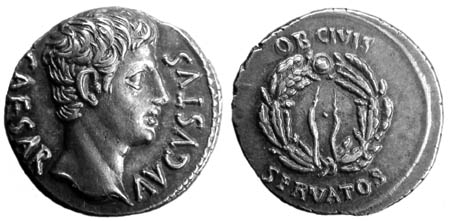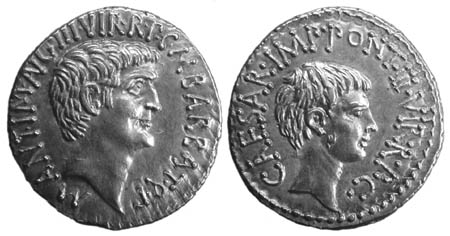THE TWELVE CAESARS
ACTA ACCLA, March 2007
AUGUSTUS
Emperor 27 BCE - 14 CE
Text & Verses By Ted Blake
Augustus was the first princeps or emperor. He was one of the most talented, energetic and skilful administrators the world has ever known. He was born Gaius Octavius in 63 BCE of fairly humble origins. The family was of middle class equestrian standing in the steep-sided pyramid of Roman society. They were from the town of Velitrae, 25 miles southeast of Rome. The Octavii were bankers who owned local land and other assets and no doubt cultivated the usual symbiotic relationship that has always existed between financiers and those in power. They probably provided financial services such as loans to build villas, villa improvement loans and villa equity loans etc. Enough wealth was eventually accumulated to enable Octavius’ father to enter the senate.
Octavius' mother, Atia, was his father's second wife, whose mother was Julius Caesar's sister. Therefore Julius Caesar was Octavius' great uncle, a relationship that was to profoundly affect his life and career. Atia knew which side her bread was buttered, and from an early age impressed upon young Octavius the advantage of cultivating the Julii family connections. This advice would not have been difficult for the youngster to follow; Julius Caesar, the conqueror of Gaul, and ruthless rising political star would have been a natural role-model for any youngster.
As a child, Octavius possibly saw more of Julius Caesar than his own father who was away successfully governing Macedonia. Upon his return to Rome, on the threshold of a consular career, his father died of causes unrecorded. His mother remarried a few years later, but in the interim Octavius was fatherless. Caesar, having no son of his own, took him under his wing and made sure that his education and proper upbringing continued. Dio said that Caesar saw to it that he was being educated suitably for world rule, but this may have been retrospective padding.

Augustus
Bronze head in the British Museum
His education and development were taking place against the backdrop of the interesting civil war between Caesar and Pompeius resulting in a victory for Caesar at Pharsalus, after which he pursued Pompeius into Egypt. The Egyptians obligingly murdered Pompeius, and Julius Caesar settled the war between Cleopatra VII and her brother by establishing her as Queen, her brother having obligingly got himself drowned while trying to escape Caesar's forces. This ensured a stable supply of Egyptian corn for Rome. Cleopatra would not have won a Miss Egypt beauty contest but was well educated, highly intelligent, spoke several languages, and had a lively engaging personality. She was actually of Macedonian-Greek descent. Julius Caesar was many years her senior, but power acts as an aphrodisiac, so it was inevitable that these two would get the hots for each other which they did.
While Uncle Julius was happily getting his leg over with Cleo, young Octavius was engaged in serious matters of his own; at the age of fifteen, he assumed the toga virilis which marked the transition to adulthood. This was a formal public ceremony during which the boys laid aside their toga praetexta and became officially enrolled as adult citizens. According to Dio, it was marred by a potentially bad omen in the case of Octavius; as he was putting on his new tunic, the seams came apart and it fell to the ground around his feet. With great presence of mind, while making a mental note to arrange a nice little crucifixion party for his tailor, he cried out "I shall have all the senatorial dignity at my feet". This showed a quick and manipulative young mind.
At sixteen he was appointed a priest (pontifex), and it is thought that Caesar had some hand in the appointment. He also had him appointed praefectus urbi during the celebration of Feriae Lainae which gave him some administrative experience in keeping the plebs from getting too uppity, and maintaining public order in the absence of the magistrates during the celebration. During this period Octavius was continuing his education and quietly observing the political scene, and becoming knowledgeable in the realities of Roman society. It was also considered vitally important that youths gain some military experience, so Julius Caesar proposed taking him on his expedition to Africa to finish-off the Pompeians. Octavius was often plagued by ill health, and on this occasion, Atia protested and Caesar gave way so as not to endanger his nephew. Illnesses of unknown causes continued throughout his life and defy explanation. Considering his delicate health, his subsequent career and rise to power is all the more remarkable.
Octavius was closely associated with Caesar from 46 BCE onwards and accompanied his great-uncle everywhere and even rode behind Caesar’s chariot in the African war-triumph although he had no hand in it. There is no doubt that Octavius was being put on the fast track to success. It is thought that Caesar discussed matters of politics and policies with his nephew. He had a certain influence with great man, and managed to successfully intercede on behalf of his friend Agrippa’s brother, taken prisoner fighting against Caesar on the side of the Pompeians. This favor was to pay handsome dividends later. Others approached him to intercede on their behalf, but he was discreet enough not to push his luck too far with Caesar in this regard.
He joined his uncle in Spain in 45 BCE in the campaign against the sons of Pompey and in the same period was sent together with his friend Agrippa to Appolonia in Epirus to complete his academic and military studies, and it was there in 44 BCE that he learnt of his uncle’s assassination.
One can only imagine the trauma of this loss to the young Octavius who was only eighteen; he had lost his surrogate father and mentor. He set out for Italy with Agrippa and some friends and landed at Brundisium where he heard that Julius Caesar had made him his heir. Against the advice of his ever cautious stepfather and others, he decided to take up the perilous inheritance. He now assumed the name of Gaius Octavius Caesar, and resolved to avenge his uncle’s murder. He failed to persuade Marcus Antonius, Caesar’s principal supporter, to hand over Caesar’s assets and documents. Antonius had obtained them from Calpurnia, Caesar’s widow, and had probably embezzled the assets to pay off some of his numerous debts.
Understandably, Marcus Antonius (Mark Antony) considered himself to be the rightful heir to Julius Caesar; he was senior in years and military experience to the youthful Octavius, to whom he was contemptuous. Antonius was an excellent general and field commander and with his charismatic personality had a good relationship with his men. However, he was a half educated profligate, and his good qualities were nullified by some of his vices, among them the drinking and womanizing which had made him popular with his men. Julius Caesar could see in Octavius more intrinsically steadfast qualities of character coupled with a quiet self-controlled but nevertheless ruthless ambition to succeed. Moreover he was well educated and more suited to administer the empire that Caesar hoped would exist after the various war-lording factions had ceased to exist. He therefore chose to make Octavius his heir and adopted son. The choice was the right one and profoundly affected the future of the Roman world.
The political situation at this time had become tense; the assassination of Caesar had destabilized the political scene; the assassins had left Rome, having been fobbed off by the senate with the job assuring a steady corn supply, a job they disdained, instead, they assembled armies in the East and Macedonia. The conservative republicans were distrustful of the Caesarians, and the Caesarian factions were rivals and didn’t trust one another. Also, Sextus Pompeius was waiting in the wings ready to stir things up at the first opportunity.
Octavius now proceeded to assert himself against the contemptuous attitude of Antonius. His first step was to celebrate the Games of Victory of Caesar to win public support. He made overtures to the Republican Party which that were well received, and two legions went over to him. On the initiative of Cicero, the senate granted him the status of senator, and enlisted his support against Antonius. Octavius, with his own legions, accompanied two consuls and their troops on the campaign against Antonius who was duly defeated at Mutina, and forced to retreat into Gaul. The two consuls bit the dust during this campaign; one died instantly and the other of his wounds. Octavius asked the senate for their legions, but was refused. The senate proposed handing them over to Decimus Brutus. This of course was anathema to Octavius, who sensed that he had been used and was now being sidelined. He promptly took matters into his own hands by taking command of the troops. The senate became alarmed at this sudden acquisition of power, especially when he crossed the Rubicon, and marched upon Rome, nearly frightening the senators out of their togas, especially those connected to the conspirators.
Legions are descending upon us like a flood
Caesar’s son his uncle will avenge
These wolves are howling for our blood
And move forward with deadly intent
Vultures are circling slowly overhead
Waiting to pluck the eyes out of our severed heads
We whose cowardly daggers did strike Caesar down
Beseech you oh Zeus, send a bolt, and strike him dead
The Senate made desperate attempts to stop his army; it offered money to the troops which Octavius refused, it also tried offering him a consulship in absentia which he, despite his youth, was wise enough to see through, and refused. Laughably, the Senate's final effort was to import three legions from Africa to protect the city. These legions promptly went over to Octavius when they saw the force they were up against which possibly originated the saying "if you can't beat them, join them". He entered the city and demanded a consulship which the Senate granted. From the treasury he paid the bounties promised to his troops. The murderers of Caesar were put on trial in absentia and outlawed. A legal recognition of his inheritance was now granted and his name by Roman custom was now, Gaius Julius Caesar Octavianus, a name which he did not actually use. To his troops he was known as Caesar, but he was generally known as Octavian from then onwards.
Octavian could see that in order to avoid a civil war, it was necessary to reach some accommodation with Antonius. A meeting was arranged by Lepidus who had been a supporter of Julius Caesar. The meeting took place on an island in a tributary of the river Po. After shaking each other warmly by the throat, Antonius, Octavian and Lepidus sat down and carved up the empire between them, mafia fashion. Antonius was to have the East, Octavian, the West, and Lepidus, Africa. Thus the union of the Caesarians was formed known as the Second Triumvirate and was officially allocated a five year appointment as triumvirs for the constitution of the state.
In the course of the meeting, a proscription list of their enemies was drawn up. They were not going to repeat Caesar's mistake of clemency. Each of the three had his own enemies and there was some overlap. At Antonius' insistence, Cicero was included. There followed a purge that would have warmed the cockles of Uncle Joe Stalin’s heart. It would have made him feel all warm and fuzzy inside. Stalin used to say "eliminate the man, eliminate the problem". The Triumvirate could have taught Stalin a thing or two; not only did they eliminate the man, they killed his wife, children, family members, plus any personal infrastructure such as agents, bankers etc. It was a preemptive surgical strike against any who had slightest possibility of plotting against them in the future. Rome was sealed off to prevent escape, and the killing proceeded. As can be imagined, there were acts of heroism and acts of cowardice; some slaves tried to protect their masters, others betrayed them. Some committed suicide to avoid being subjected to such Roman niceties as torture or crucifixion.
Some two thousand equites and three hundred senators were slaughtered – terminally laid off one could say. Among the victims was the orator Cicero who met his end bravely. His severed head was brought to Antonius' charming wife, Fulvia who further mutilated it, after which it was nailed, together with his hands to the Rostra in the forum where he had made his speeches.
Cicero the great orator
Was vocal and exceedingly clever
But with a sword at his neck and
A nail through his head
His tongue was silenced for ever
After this episode, Antonius and Octavian crossed into Macedonia to settle their score with Brutus and the lean-and-hungry-looking Cassius who were defeated and killed at Phillipi. Antonius took the lead in the operation owing to Octavian’s health problems.
The Triumvirate now formerly divided up the empire as agreed; Antonius was to have the East and Gaul, Octavian, Italy, and Lepidus, Africa. The alliance was sealed by Antonius’ marriage to Octavian’s sister, Octavia with whom he lived in Athens for three years. Domesticity inevitably palled for someone like Antonius, used as he had always been to a rich fare of attractive Italian women and the occasional Syrian dancing girl, he abandoned her to return to Cleopatra with whom he’d had a fling earlier.
Octavian went back to Italy. There problems arising from the settlement of his demobilized troops, involved him in a campaign against Antonius’ brother Lucius Antonius. The conflict became known as the Perusine war culminating in the terrible siege of Perusia in 41 BCE. In order to conciliate another potential foe, Sextus Pompeius, son of Pompey the Great, who controlled Sicily, Octavian married Sextus’ relative, Scribonia. However, not long after, in 40 BCE, he reached an agreement with Antonius which jettisoned Sextus, encouraging Octavian to dump Scribonia, which he did by divorcing her on the very day she gave birth to their daughter Julia. He then forged a link with the aristocracy, by marrying the young and beautiful Livia Drusilla, who had married very young and had two sons from her previous marriage, one of whom was Tiberius. They remained life-long partners despite a few infidelities on his part.
Octavian now had to deal with Sextus in Sicily. After some serious reverses, Octavian called upon Agrippa to take supreme command realizing that his own expertise was civilian not military. Lepidus brought legions from Africa and in 36 BCE, Octavian’s brilliant admiral, Agrippa, overwhelmed the fleet of Sextus Pompeius off the coast of Sicily. Sextus Pompeius fled to Asia where he was later hunted down and killed by Antonius, an action which did not enhance his reputation with some Romans. At the same time, Lepidus, probably piqued by having been fobbed off with Africa, saw fit to challenge Octavian militarily with his twenty two legions and demanded Sicily for himself, but his troops were not willing to shed more blood on his behalf and preferred Octavian. Lepidus was disarmed, stripped of his triumvirate powers, and forced into permanent retirement, but retained his post as pontifex maximus.
In the following years, Octavian busied himself founding colonies for his loyal ex-soldiers and making the Northeast borders safer. Assisted by Agrippa, Octavian spent massive sums on the architectural adornment of Rome. Over the years, Octavian had engendered popular goodwill, based not only on his name, but on a solid reputation for achievement.
For his part Antonius had plenty to do; the northern marches of Macedonia had to be secured, and also, the Parthians never ceased to threaten Asia Minor. All this needed money, and he became increasingly dependent upon the wealth of Egypt through Cleopatra. In 37 BCE, he packed a pregnant Octavia off back to Italy, and shortly afterwards publicly acknowledged his twin children by Cleopatra who was dreaming of recreating the great empire of her Ptolemaic ancestors. In the Autumn of 34 Antonius celebrated the triumph for his Armenian campaign in Alexandria which was an insult to Rome. Cleopatra sat on a high golden throne and assumed the place of Jupiter Optimus Maximus to receive the gift of prisoners. Antonius provocatively proclaimed Cleopatra’s son Caesarion to be the legitimate issue of Julius Caesar, and much of the East was parceled out to Cleopatra, Caesarion, and Cleopatra’s three children by Antonius, Ptolemy, Cleopatra, and Alexander. These were reckless and unwise actions on the part of Antonius who was becoming his own worst enemy.
The political equilibrium that had existed under the triumvirate was beginning to unravel, and a power struggle between Antonius and Octavian was almost inevitable. The rift between Octavian and Antonius was growing wider, and the conflict was about to begin. The triumvirate had officially come to an end in 32 BCE. Antonius had made a serious political blunder by teaming up with Cleopatra; she was queen of a people who the Romans considered inferior and whom they neither liked nor trusted. Octavian was able to exploit this to the full, which he did by conducting a virulent propaganda war against Antonius and Cleopatra. Antonius divorced Octavia, whereupon Octavian seized Antonius’ will and disclosed to the public that Antonius had willed imperial territories to Cleopatra. Octavian now had the ammunition with which to attack Antonius. He avoided an open attack on Antonius because he still had some popular support among the populous and with some senators. Instead, he attacked Antonius obliquely, by attacking Cleopatra, who he considered had violated her status as a client of Rome. Finally, he declared war upon the foreign queen.
Antonius and Cleopatra lined the West coast of Greece with their navy and troops, but Octavian surprised them by sending Agrippa across the Ionian Sea to capture Methone. Before long, their fleet was trapped inside the Gulf of Ambracia. From now on it was all downhill for Antonius. An attempted break-out was made, which resulted in the battle of Actium. Antonius and Cleopatra managed to escape into the open sea with a quarter of their fleet and sailed to Egypt. The rest of the fleet was either destroyed or surrendered to Octavian. The land forces instead of following Antonius’ orders to march north and escape through Syria, seeing which way the chips were falling, negotiated with Octavian and obtained favorable terms in exchange for going over to him.
Octavian invaded Egypt the following year. Antonius, thinking that Cleopatra had committed suicide, attempted suicide by falling upon his sword, but muffed it. He was carried on a stretcher to Cleopatra, in whose arms he died. Cleopatra was taken prisoner by Octavian, and although treated with courtesy, committed suicide by means of a poisonous snake rather than face the humiliation of being paraded through the streets of Rome as part of a triumph. It was a sad end to someone of her great talents and abilities. Octavian then ordered her sixteen year old son by Caesar, Caesarion, to be hunted down and killed, as was Antyllus, Antonius’ son by Fulvia. These acts of cold-blooded murder ensured that there was no longer any danger to the foundations of his power. Cleopatra’s children by Antonius however, were spared, and were looked after by the thoroughly decent Octavia in Rome. Octavian annexed Egypt which was then ruled through his representatives. His troops were paid off by money looted from Cleopatra’s treasury, and settled in the large number of colonies throughout the Roman world.
The army and the fleet were now reduced and reorganized, and the officer corps placed on a more regular footing than before. Army retirement bounties were eventually financed from a military treasury derived from taxes. The military reforms were just part of an overall process that created the Roman Principate. In the three years after Actium, Octavian’s rule was of a personal and irregular nature, and he took care not to formalize his ascendancy, and tidied up loose ends in preparation for his first constitutional settlement of 27 BCE when he formally restored the government to Senate and the people.
The Augustan age had begun; Octavian retained continuous consulship from 31 to 23 BCE and maintained full control, but paid lip service to Republican traditions and to a compliant senate which was grateful for peace and stability. At the same time he was officially awarded for a period of ten years, the government of Spain, Gaul and Syria, the regions that contained the bulk of the army. The remaining areas of the Empire, outside Italy, were administered by proconsuls ostensibly appointed by the senate but whose choice was influenced by Octavian.
The emperor’s prestige was such that he received the designation “Augustus” which conveyed his superiority over other human beings. Then at the death of Lepidus, in 12 BCE, Augustus succeeded him as official chief priest (pontifex maximus) of the state religion. Having got religion, His Holiness displayed veneration of the old Italian religion by resuscitating many of its antique rituals and repairing many of its broken down temples, thus providing employment to many while providing spiritual comfort to the masses.
His constitutional settlement of 27 BCE had been followed by forceful steps to extend and pacify the imperial frontiers; subdue the uppity Alpine tribes, and annex Galatia. Augustus himself directed the campaign to complete the subjugation of Spain, but his health suffered a serious collapse. In 23 BCE he seemed on point of death, and put an end to the continuous series of consulships he had held, and assumed the imperium majus which raised him above the proconsuls, and separated him from office and its practical chores. He was also granted the power of a tribune or potestas tribunicia. This award conveniently empowered him to summon the senate, but in particular because it was the traditional role of the annually elected tribunes of the people to defend citizen’s rights, it enveloped him in a democratic aura, all the more needed because the true foundations of his system were provided by the support of the established classes. Augustus, very sensibly, steered a middle way between republicanism and a dictatorship. In 19 BCE there were further adjustments to Augustus’ power to streamline his introduction of legislation some of which was to encourage marriage, and curb adultery, which was a bit of a laugh considering his own record in this regard was not exactly spotless. In practice it had little effect, especially on his daughter Julia whose promiscuity was legend.
A few years later, the consilium pricipis, an executive drafting committee comprising friends of Augustus, helped him prepare the business for consideration by the senate. His burden was further diminished by the formation of an embryonic civil service which increased executive efficiency. Meanwhile, the entire administration of the empire was being overhauled including the financial structure and the tax system. The Augustan peace provided a stimulus to trade, and this was facilitated by expansion and improvement of the coinage.
Although the position of emperor was not a formal office to which a successor could be appointed, public attention naturally centered on Augustus’ plans for the future. Although the widowed Julia had been given to Agrippa in marriage, the senate would never have accepted him as ruler. Therefore, Augustus adopted their children, Gaius and Lucius aged three and one, as his own sons. Nevertheless he gave the task of extending the frontiers of the empire to his adult stepsons Tiberius who extended them to the Danube.
Agrippa, despite his robust health, died at the age of fifty. Augustus then obliged Tiberius to marry the widowed Julia despite the fact that he was happily married to Agrippa’s daughter, Vipsania. Both were reluctant, and this prize piece of domestic interference on the part of Augustus produced a miserable marriage for them both. Tiberius and his brother spent the next few years fighting in the north, but Nero Drussus, after advancing as far as the Elbe died in 9 BCE. Three years later, Tiberius was elevated to share Augustus’ tribunician power, but retired to Rhodes for several years to escape the humiliation of Julia’s scandalous behavior.
Julia had been married at fourteen to her cousin Marcellus, but was left a widow at sixteen, and promptly married off to the elderly Agrippa with whom she had five children. She was reasonably happy with him, but when he was abroad on duty she amused herself with books, dresses, and young men. Augustus scolded her, but failed to keep an eye on her. Her marriage to Tiberius was doomed to failure, his heart was still with the woman he’d been forced to divorce, and he was ill fitted to be the mate of an audacious and brilliant woman. Julia moved among the young set in Rome, and rumors of her affairs began to circulate. She was seen with drunken revelers in the street and was a frequent guest at dubious male parties. Augustus learned from Livia what was going on and was anguished, especially as he trying to purify Roman morality.
For the emperor it must have been extremely tough
To have a daughter who just couldn’t get enough
Prone as she was to frequent moral lapses,
She blamed it on the wiring of her synapses,
At a party one night, with the wine flowing freely,
A young knight grabbed her rear,
Saying, "How about a bit of fun my dear"
"Young sir" she said "please desist."
But in the end of course, she just couldn’t resist.
They spent a torrid night together to her great delight.
Being thoroughly serviced by that randy knight
In the morning without the slightest shame,
Julia said "Let's meet next week, and do it again".
Augustus learned that Julia had also been involved with some senators, which with its possible political implications, alarmed him. He solved the problem by sending her into exile on the barren island of Pandataria, which must been a dire punishment for a fun-loving girl like her. After five years, she was allowed to return to live in the south of Italy till her death.
Tiberius returned to Rome as Augustus' adoptive son and successor following the deaths of Lucius and Gaius in 2 CE and 4 CE respectively. Some writers have speculated that Livia arranged their deaths to ensure Tiberius’ succession. This makes great TV drama, but is not supported by the facts; Lucius died in Marseilles on his way to a mission in Spain and Gaius died of wounds received while quelling an Armenian riot. The emperor had to recognize his advancing age, and in 13 CE, Tiberius was made his equal in every constitutional respect. Then Augustus lodged his will at the house of the Vestal Virgins.
He died in 14 CE. Livia his wife and companion of fifty two years survived him for fifteen years and died at the age of eighty six.
Augustus was one of the most talented, energetic and skilful administrators that the world has ever known. His far-reaching work of reorganizing the vast empire created a new Roman peace in which most benefited from improved communications and flourishing commerce. The regime that he created was to have a long life, lasting as it did for two hundred years, and which ensured the survival of the political, economic and cultural heritage of the classical world both Greek and Latin.
BIBLIOGRAPHY
Augustus. Pat Southern. Routledge, 2001.
Augustus. John Buchan. Houghton Mifflin, 1937.
The Roman Emperors by Michael Grant. Barnes & Noble Books, 1997.
Mark Antony. Eleanor Goltz Huzar. University of Minnesota Press, 1978.
SUGGESTED WEB RESOURCES ON AUGUSTUS
Augustus on De Imperatoribus Romanis
Cassius Dio - Roman History Book XLV
Suetonius, The Lives of the Caesars - The Life of Augustus (English)
Suetonius, De Vita Caesarum - DIVVS AVGVSTVS (Latin)


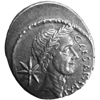 Julius Caesar
Julius Caesar Augustus
Augustus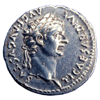 Tiberius
Tiberius Caligula
Caligula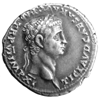 Claudius
Claudius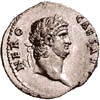 Nero
Nero Galba
Galba Otho
Otho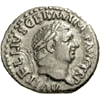 Vitellius
Vitellius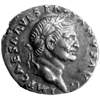 Vespasian
Vespasian Titus
Titus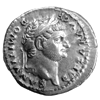 Domitian
Domitian